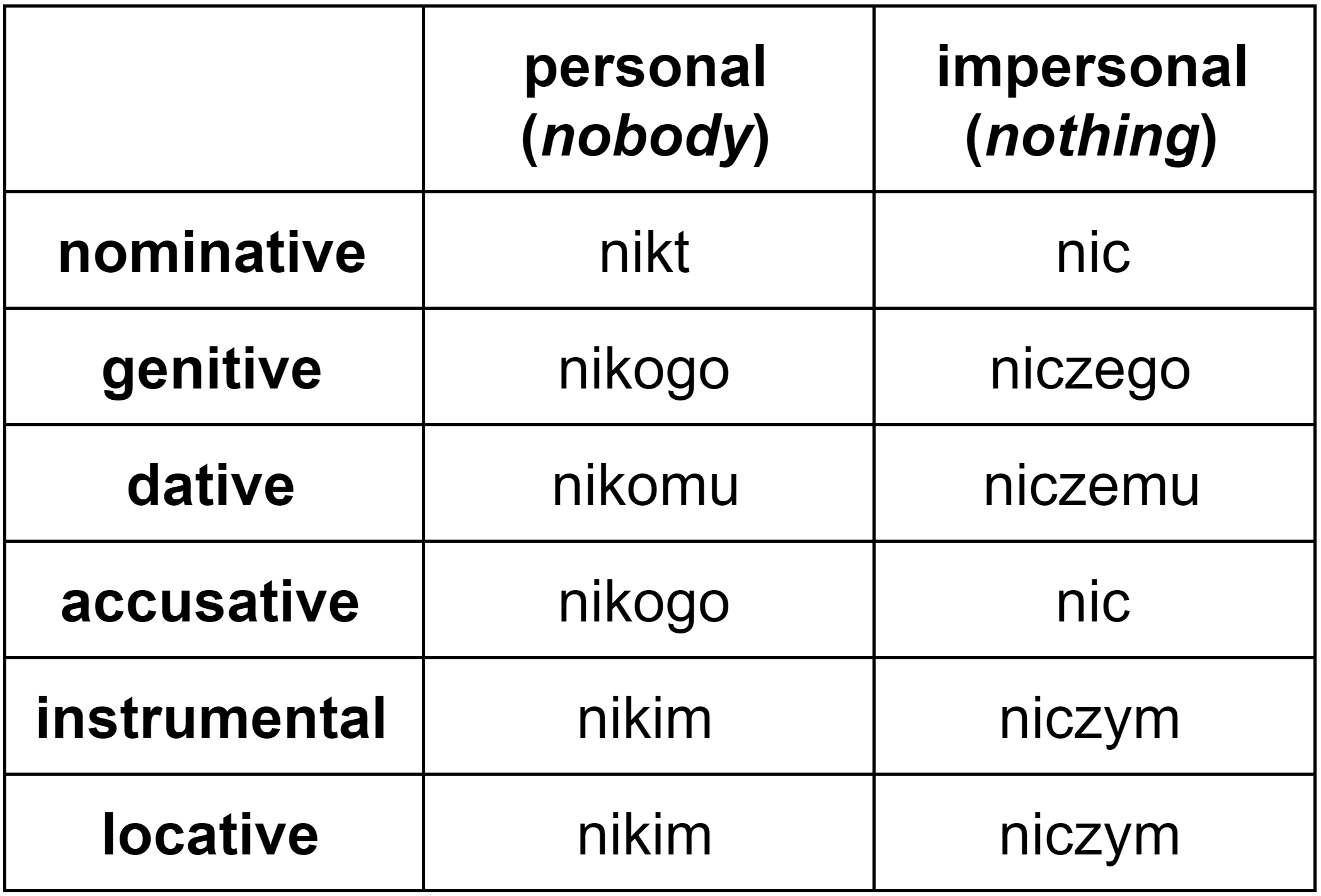The Polish negative indefinite pronouns nikt and nic are roughly equivalent to the English negative pronouns nobody (or no one) and nothing. As the name would suggest, the pronouns are used to negate things or declare their non-existence.
Here are some sentences with nikt and nic in context:
Nikt nie jest doskonały. (“Nobody is perfect.”)
W pudełku nic nie było. (“There was nothing in the box.”)
Probably the most “controversial” thing about Polish negative pronouns – at least from the point of view of an English speaker – is their reliance on the double negative.
That’s right: negative pronouns nikt and nic are almost always accompanied by the negative participle nie (“no” / “not”). In fact, even triple negations are perfectly normal in Polish:
Nikt nic nie wie. (“Nobody knows anything.”; literally: “Nobody doesn’t know nothing.”)
This brings us to our next point. Because of the double negative, Polish has no need for a distinction similar to nobody vs. anybody (or nothing vs. anything) in English. Nikt and nic fill both roles, so in some contexts, they’re more likely to be translated as anybody and anything
Dlaczego nikt nie pomaga Tomowi? (“Why doesn’t anybody help Tom?” / “Why does nobody help Tom?”)
Nic nie powiedziałem. (“I didn’t say anything.” / “I said nothing.”)
While nikt and nic are almost always seen together with the negative particle nie, the particle doesn’t have to come immediately after them.
In fact, in any sentence with nikt or nic, it is usually the verb that is negated by nie, and not the pronoun itself.
Nie mogę nic zrobić. (“I cannot do anything.”)
Nikt ze mną nie rozmawia. (“Nobody speaks with me.”)
Grammatical case of the Polish negative pronouns
Nikt and nic are no different to other Polish pronouns in that they change their endings based on their grammatical function in the sentence. Both pronouns have separate forms in six cases.

If these forms remind you of something, you’re probably thinking of the interrogative pronouns kto (“who”) and co (“what”) – nikt and nic are actually their negative counterparts.
In fact, all the forms in the above table, with the exception of the base forms nikt and nic, have been created by adding ni- to the corresponding forms of kto and co.
Let’s discuss all the forms case-by-case.
Nominative: nikt, nic
The nominative forms nikt and nic are used to talk about the subject of the sentence. In other words, you mostly use them to say that:
- nobody or nothing does something,
- nobody or nothing is someone or something.
Dlaczego nikt nic nie robi? (“Why isn’t anybody doing anything?”)
Prawie nikt mu nie wierzył. (“Almost nobody believed him.”)
Nic się nie stało. (“Nothing happened.”)
Nic nie cieszy Toma. (“Nothing makes Tom happy.”)
Genitive: nikogo, niczego
The genitive forms nikogo and niczego are usually used to refer to:
- the direct object in a negative sentence,
- the direct object of verbs such as szukać (“to look for”), potrzebować (“to need”), or używać (“to use”),
- objects following the prepositions dla (“for”), od (“from”), and do (“to”).
Nikogo tam nie ma. (“There is nobody there.”)
Tom się do nikogo nie odzywa. (“Tom doesn’t talk to anybody.”)
Nie zauważyłem niczego podejrzanego. (“I didn’t notice anything suspicious.”)
Nie potrzebuję niczego. (“I don’t need anything.”)
Dative: nikomu, niczemu
The purpose of the dative forms nikomu and niczemu is referring to:
- the indirect object of the sentence (someone or something to whom or for whom an action is done),
- the object of verbs such as dawać (“to give”), wierzyć (“to believe”), dziękować (“to thank”), or pomagać (“to help”).
Nikomu nie powiedziałem. (“I haven’t told anybody.”)
Nikomu nie otwieraj drzwi. (“Don’t open the door to anyone.”)
On niczemu nie wierzy. (“He doesn’t believe anything.”)
Niczemu nie zaprzeczyła. (“She didn’t deny anything.”)
Accusative: nikogo, nic
The accusative forms nikogo and nic mostly appear after verbs indicating some kind of motion or after specific combinations of verbs and prepositions, such as czekać na (“to wait for”):
Nie czekam na nikogo. (“I am not waiting for anybody.”)
Julia nie wyjdzie za mąż za nikogo innego. (“Julia will not marry anybody else.”)
Tom o nic nie prosił. (“Tom didn’t ask for anything.”)
Nie liczyliśmy na nic specjalnego. (“We didn’t expect anything special.”)
Instrumental: nikim, niczym
Uses of the instrumental forms nikim and niczym usually involve one of the following:
- the verbs być (“to be”), zostać (“to become”),
- certain prepositions, such as z (“with”), przed (“before” / “in front of”), and za (“behind”),
- the means (= the instrument) used to do something.
Przed nikim nie uciekam. (“I’m not running from anybody.”)
Marek z nikim nie rozmawia. (“Marek doesn’t talk to anybody.”)
Twoje problemy są niczym w porównaniu z moimi. (“Your problems are nothing compared to mine.”)
To jej ulubiony długopis, nigdy nie pisze niczym innym. (“This is her favorite pen, she never writes with anything else.”)
Locative: nikim, niczym
Finally, the locative forms kim and czym are only used together with certain prepositions, among others o (“about”), w (“in”), and na (“on”).
O nikim nie rozmawiamy. (“We aren’t talking about anybody.”)
Julia nigdy się w nikim nie zakochała. (“Julia never fell in love with anybody.”)
On nie jest w niczym dobry. (“He’s not good at anything.”)
Marek jeszcze o niczym nie wie. (“Marek doesn’t know about anything yet.”)
Polish Pronouns Grammar Challenge
You’ve read everything there was to read. And you’ve probably understood most of it. But are you ready to use the Polish negative pronouns in real contexts?
Take up the challenge and start learning with the Polish Pronouns Grammar Challenge.

